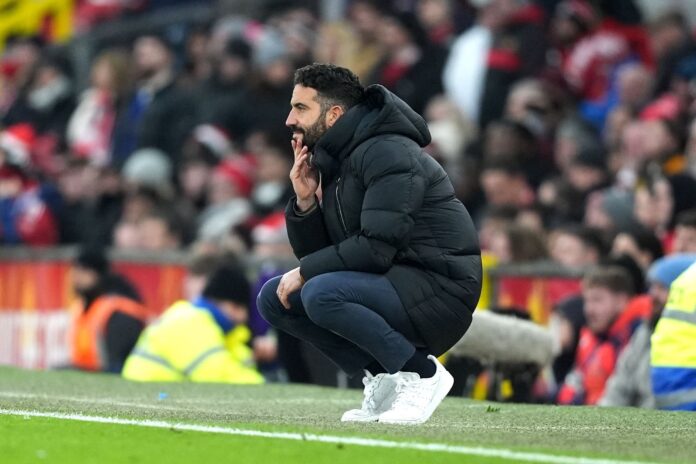Manchester United head coach Ruben Amorim said he is not concerned about his job at the end of another day when a previous step forward was followed by another one back.
The optimism generated by the victory over Chelsea seven days ago was lost in a 3-1 defeat at Brentford that keeps United firmly in the bottom half of the Premier League.
United have collected 34 points from Amorim’s 33 league games in charge and have still to win successive matches.
The promised improvement after last season’s woeful 15th-place finish is yet to materialise, and afterwards Amorim was forced to answer more questions about his future.
“I am never concerned about my job – I am not that kind of guy,” he told BBC Match of the Day.
“It is not my decision. I will do the best I can every minute I am here.”
United officials have repeatedly stressed their support for the former Sporting boss, but it is days like this when that belief is called into question and, with no midweek games to divert attention, ensure the inquest is extensive.
Former Wales midfielder Ashley Williams told BBC Final Score: “I don’t want to say they change manager, but how long can this continue? It seems to be every week that we’re talking about it.
“I’m a fan of managers who have a style and stick to it. That isn’t working. You have to adapt.
“I don’t see where Manchester united go with this unless they change manager.”
Ex-Arsenal defender Martin Keown added: “They don’t look good enough. You then look at it and he only has a win percentage 1% more than Graham Potter, who has been sacked. How is he still in the job?
“If he was 12 months after Ferguson, this would have been done weeks ago.”
‘Being stubborn could be Amorim’s undoing’
The problem for Amorim is that, by his own admission, his messaging is not bearing fruit.
Bruno Fernandes’ second missed penalty out of three this season was a contributing factor as United extended their wait for an away win in the league to eight games, their worst run since 2019.
Since Amorim’s tenure began last November, no team has conceded the first goal in more league games than United.
He said his players had worked on Brentford’s likely gameplan – flooding the midfield to create overloads and playing long balls into the forward positions, particularly behind the wide central defenders Luke Shaw and Matthijs de Ligt – but, when it came to the execution, they were found wanting.
“The goals today, we worked on during the week,” Amorim said. “That is frustrating.
“I see the guys in training. I feel sometimes in the games, when things are really hard, they are not the same. But that is the pressure of the club.”
For some observers, it boils down to Amorim’s 3-4-2-1 system, which he steadfastly refuses to change.
Rookie Brentford manager Keith Andrews showed flexibility by switching from the five-man defence he deployed in the defeat at Fulham last weekend to a back four, which, he said, “gave us a better base and fluidity in midfield”.
“When you entice players on to you, they vacate space,” he said.
Former Manchester City defender Micah Richards, analysing the game for Match of the Day, was less diplomatic in his assessment.
“Amorim being so stubborn in what he’s trying to do could be the undoing of him down the line,” he said.
“We can talk about the owners backing him, but ultimately it’s just not working.”
Richards described the two goals United conceded in the opening 20 minutes as “shambolic”.
For the first, Harry Maguire tried to play offside but his starting position was a yard off the halfway line.
For the second, Kevin Schade exploited space on the right side of United’s defence and delivered a low cross that goalkeeper Altay Bayindir pushed into the danger zone.
On both occasions Brentford’s Brazilian forward Igor Thiago capitalised.
Predictably, Amorim defended the way he set his team up.
“When we win, it’s not the system. When we lose, it’s the system. I understand that,” he said, the sarcasm dripping off his tongue.
“It’s more that we play this game the way Brentford wants to play it.”
The problem for Amorim is that his assessment highlights basic issues that should not be happening so often so far into his tenure.
“It’s like ups and downs,” said Amorim, when asked for his thoughts about the setback.
“When you win, you feel that everything and that the momentum is here. When you lose, you go back to the same place and fight again for the one win that can help you to create the momentum.
“I cannot tell you more than I say every time I lose the game.
“Sometimes you see one team that performs really well and you see improvements, and then sometimes you have some games that you don’t see the improvement that gives you the confidence to say that Manchester United is going to get back.
“It’s always the same conversation.”



